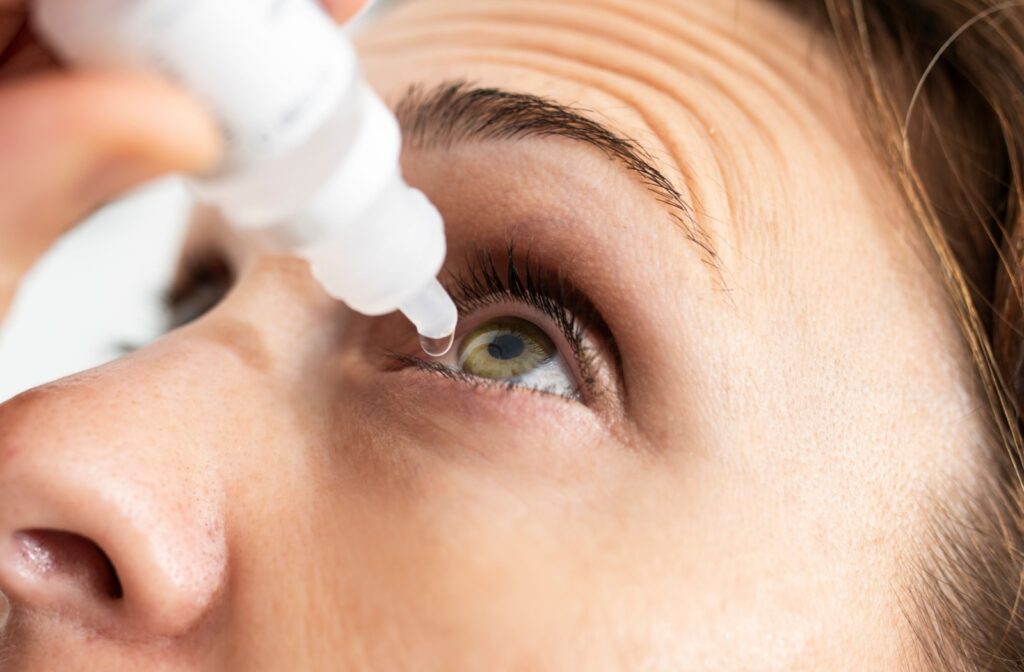You open your eyes to greet the day, but your view of the world is fuzzy and out of focus. This common experience can be a bit disorienting, leaving you to blink rapidly in an attempt to see clearly. However, while it can feel strange, a little bit of blurriness right after you wake up is often perfectly normal.
For many people, morning blurriness is caused by temporary dryness or pressure on the eye and often clears up on its own. A few blinks are sometimes all it takes to restore crisp, clear vision. However, if the blurriness lingers or you notice your eyes are also red when you wake up, this could be a sign that your eyes need a little more attention.
Common & Simple Reasons For Morning Blurriness
You open your eyes, and the world looks a bit fuzzy. For most people, this temporary blurriness is normal and clears up within a few minutes. Let’s look at some everyday reasons why your vision might not be sharp right after you wake up.
Dry Eyes From Your Sleep Environment
Your eyes produce tears even while you sleep in order to stay moist. Sometimes, the tear film on your eyes can dry out overnight, causing blurry vision when you first open them. Blinking a few times usually helps restore moisture and clear things up.
Common causes of morning dry eye include:
- A fan or air vent pointed at your face
- Low humidity in your bedroom
- Not enough hydration throughout the day
- Incomplete lid seal where your eyes don’t fully close at night
Allergies & Other Irritants
If you have allergies, your eyes can become watery, itchy, and swollen. This reaction, a form of allergic conjunctivitis, can make your vision blurry due to allergens disrupting your tear film overnight. If you’re allergic to things in your bedroom like dust mites or pet dander, you’re most likely to have these symptoms in the morning.
Your Sleep Habits & Position
How you sleep can also affect your morning vision. Sleeping with your face pressed into your pillow can put gentle pressure on your cornea, temporarily changing its shape and causing a brief blur. This is especially common for those who sleep on their stomachs.
The Effect Of Contact Lenses Overnight
Forgetting to take out your contact lenses before bed can reduce the oxygen that reaches your corneas. This often leads to dry, irritated, and blurry eyes in the morning. Always remember to remove your contacts to give your eyes a rest and explore the different types of contact lenses available for your lifestyle.
When Blurry Vision Signals An Eye Condition
Sometimes, consistent blurry vision in the morning points to an underlying condition that your eye doctor can help with. These issues are often manageable with the right medical eye care, so it’s helpful to be aware of the signs. Let’s explore a few possibilities.
Changes To The Cornea
Certain conditions can cause fluid to build up in the cornea overnight. This leads to significant morning blurriness that may improve as the day goes on. You might also notice halos around lights as another symptom.
Oil Gland Dysfunction
Tiny glands in your eyelids produce oil that helps keep your tears from evaporating too quickly. If these glands get clogged, a condition known as meibomian gland dysfunction, you can develop dry eyes and blurry vision. This is a common and treatable cause of eye discomfort.
Incomplete Lid Seal
In some cases, blurry vision in the morning may be related to your eyelids not fully closing while you sleep. This condition, known as incomplete lid seal, can cause your eyes to dry out overnight, leading to irritation and blurred vision when you wake up. If you suspect your eyes aren’t fully closing at night, your eye doctor can recommend treatment options or protective measures to keep your eyes comfortable and hydrated.
Your Prescription May Need An Update
Blurry vision can simply mean it’s time for a new prescription for your glasses or contacts. It’s a common myth that wearing glasses makes your eyes worse, but vision naturally changes over time. Your optometrist can perform a routine eye exam to see if your vision has changed and provide an updated prescription.
Simple At-Home Ways To Find Relief

You can often prevent or reduce morning blurriness with a few small changes to your daily routine. These simple tips can help keep your eyes comfortable and your vision clear. Taking a proactive approach can support your overall eye health.
Adjust Your Bedtime Habits
A few small tweaks to your sleep routine can make a big difference. Creating an eye-friendly environment helps your eyes stay hydrated and comfortable throughout the night. Consider these simple adjustments.
- Try to sleep on your back or side instead of your stomach.
- Point fans away from your face while you sleep.
- Use a humidifier to add moisture to your bedroom’s air.
- Always remove contact lenses before going to bed.
Use Lubricating Eye Drops
Using artificial tears before you go to sleep or right when you wake up can help remoisten your eyes. A warm compress placed over your closed eyes for a few minutes can also offer comfort and soothe irritation. These are easy and effective ways to find relief.
When To See An Eye Doctor In Westlake
If your blurry vision clears up quickly, there’s usually no cause for concern. However, you should schedule a visit with an eye care professional if you experience certain symptoms:
- Blurriness that lasts for several hours or the entire day
- Eye pain, redness, or sensitivity to light
- Blurry vision that happens every morning and isn’t improving
- Other new symptoms like headaches or dizziness along with the blurriness
How Your Optometrist Can Help
A comprehensive eye exam is the best way to determine the exact cause of your blurry vision. At Eyes on Westlake, we use modern diagnostic equipment to get a complete picture of your eye health. We can check the health of your eyes and recommend a path forward.
A Thorough Eye Health Exam
During a visit, we’ll check your vision and examine the different parts of your eye, from the cornea at the front to the retina in the back. This helps identify issues like dry eye, corneal conditions, or the need for a new prescription. We take the time to answer all your questions in a way you can understand.
Professional Treatments For Dry Eyes
If over-the-counter drops aren’t enough, we can offer other solutions. These may include prescription eye drops to increase tear production or professional treatments for dry eye to help your eyes retain moisture more effectively. We tailor our approach to fit your needs.
At Eyes on Westlake, we’re passionate about providing a warm and welcoming experience for your entire family. If you’re experiencing blurry vision or it’s simply time for your next exam, we are here to help. Schedule your visit with us today and see the difference personalized care can make.





